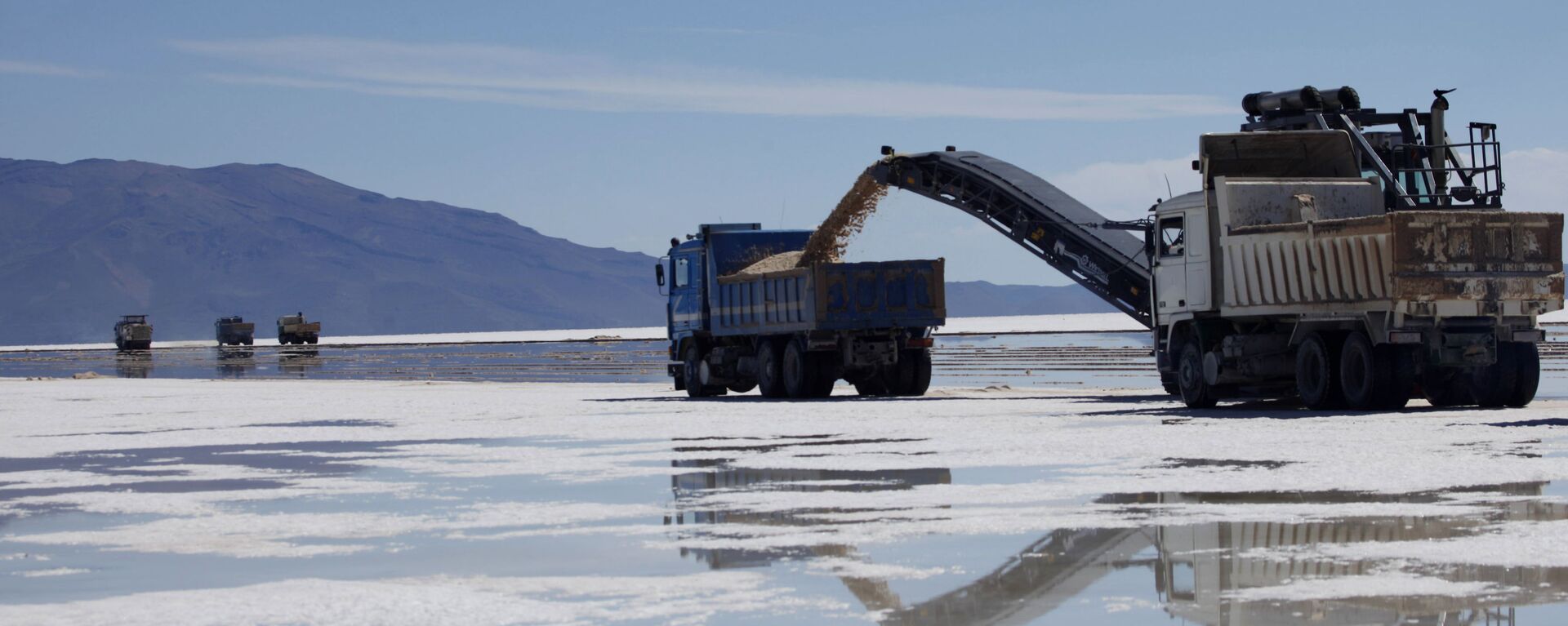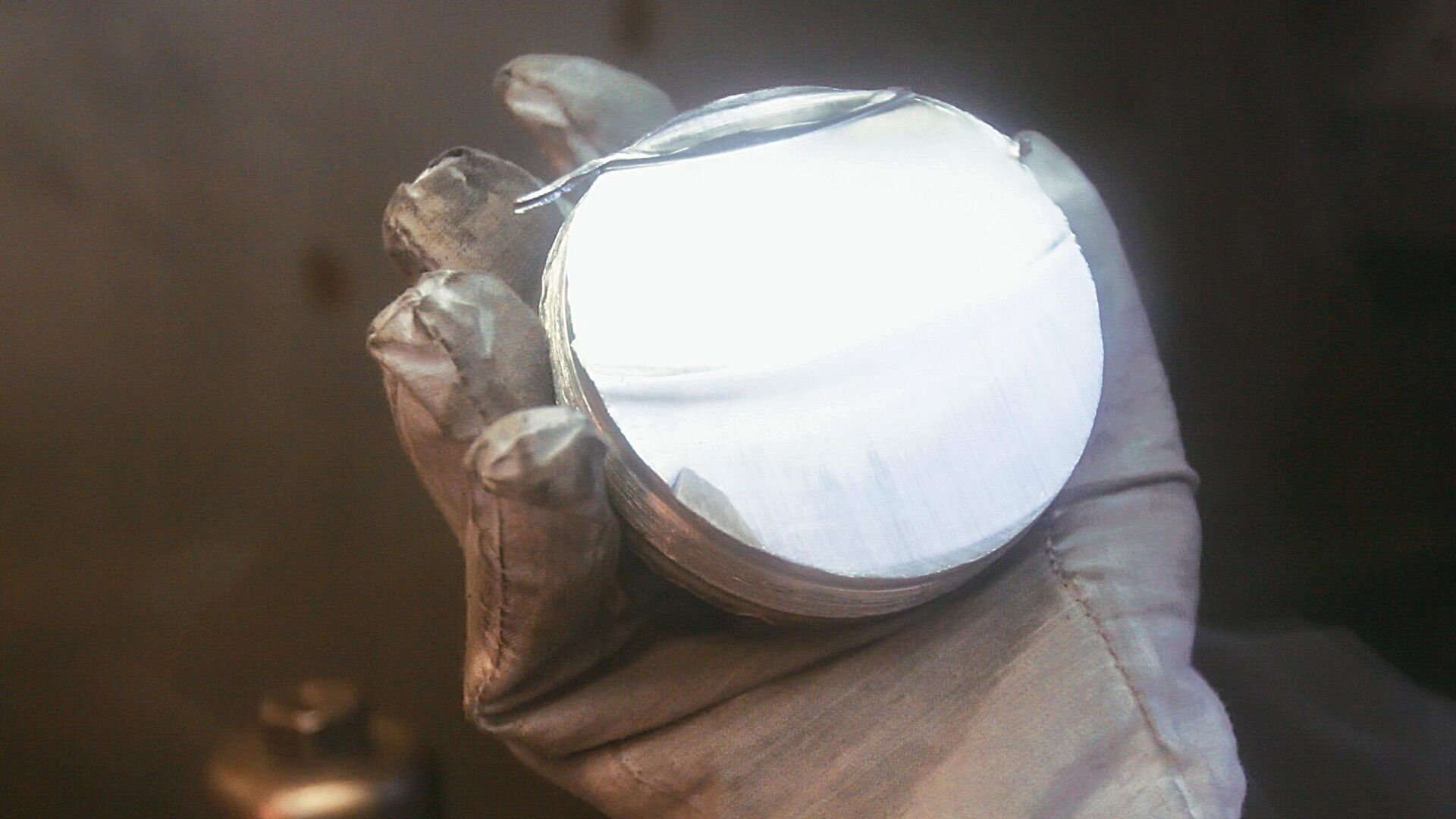https://sputnikglobe.com/20230303/they-now-need-democracy-internet-fears-for-irans-safety-as-tehran-finds-500-billion-in-lithium-1107988367.html
‘They Now Need Democracy’: Internet Fears for Iran’s Safety as Tehran Finds $500 Billion in Lithium
‘They Now Need Democracy’: Internet Fears for Iran’s Safety as Tehran Finds $500 Billion in Lithium
Sputnik International
Iran announced this week that geologists had found some 8.6 million tons of lithium in the western province of Hamadan, instantly making Iranians the owners of one of the top five largest reserves of the metal in the world.
2023-03-03T16:30+0000
2023-03-03T16:30+0000
2023-03-03T16:33+0000
economy
iran
lithium
lithium ion battery
reserves
wealth
worries
https://cdn1.img.sputnikglobe.com/img/07e7/01/1e/1106816226_0:0:2049:1153_1920x0_80_0_0_76bd065e87c3dec51d64a5f38fb66319.jpg
It will take about four years to prepare the lithium mines discovered in Qahavand Plain, Hamadan for operation, with the deposits stretching across a five-six square kilometer area, Mohammad Hadi Ahmadi, vice president of mines and mineral industries at Hamadan province’s Industry, Mining and Trade Organization, said Friday.Ahmadi hailed the precious metal’s tremendous export potential, and its possible use by many domestic Iranian industries.The estimated 8.6 million tons in lithium found by geologists instantly shot Iran up to fourth place in the world in total reserves of the precious metal after Bolivia (21 million tons), Argentina (19.3 million tons), and Chile (9.6 million tons). The US, the previous fourth-place holder, now drops to fifth with its 7.9 million tons.Lithium is a highly valuable and sought after commodity, with reserves limited, but the metal vital for a broad variety of applications, first and foremost rechargeable batteries for phones, laptops other gadgets, and batteries used in electric vehicles (about three quarters of the lithium mined annually is used in battery applications). The precious metal is also used in the production of fluorescent glass providing protection against ultraviolet rays, with about 14 percent of production for this purpose. Lithium sulfide is an integral element in semiconductor manufacturing, in chemical storage and as a current source. The metal is also used in nuclear applications, serving as a readily available source of the radioactive isotope tritium, used in the manufacture of rods regulating reactor protection systems.Lithium is also used in metallurgy as a deoxidizer, and to increase the ductility and strength of alloys, in medicine, and refrigeration systems as lithium bromide. Finally, it the metal has crucial applications in the transportation and defense sectors – with lithium hydride serving as a rocket fuel, and as a grease in a variety of mechanical applications such as aircraft maintenance. You’ve used lithium grease in the household if you’ve ever purchased a can of WD-40.A 2021 estimate by the US Geological Service put the global reserve of lithium at 86 million tons, meaning that this week’s discovery by Iran has just increased reserves by 10 percent. The precious metal has a market price of about $57,500 a ton, meaning Iran’s newfound deposits have an estimated value of about $494.5 billion.Given its applications in some of the most important global industries, lithium is a strategic resource with immense significance. In 2020, amid turmoil in Bolivia in the aftermath of a Western-backed coup, Tesla and SpaceX CEO Elon Musk nonchalantly tweeted that the US "will coup whoever we want!” after someone criticized the US policy of conspiring to remove Bolivian President Evo Morales from power. Morales responded, pointing out that Musk, “owner of a massive electric car factory,” had effectively admitted that the coup was carried out “over Bolivian lithium,” and vowing that Bolivians “will always defend our resources!” Morales’ party returned to power a year later, allowing him to safely return to his home country.Iran’s lithium wealth has sparked concerns about whether the US and its allies will be able to restrain themselves from trying to “bring freedom and democracy” to the Middle Eastern nation at the barrel of a gun.“They now need democracy,” Sputnik Radio host Garland Nixon sardonically tweeted in response to the news.“Oh, look. Iran just found the United States’ lithium under their country. Time for the US to take them some democracy,” another person joked. “Well, you know what that means. Sudden intense US ‘concern’ for Iranian human rights will be used to justify depriving a lot of Iranian human beings of their right to live,” another wrote. “Damn, Iran hide your lithium; the pirates are hungry to spread their ‘freedom and democracy’,” another recommended.“Exciting and incredibly scary at the same time. Iran must prepare itself for unprecedented horrors levied against it by the imperialists,” another person suggested. “Operation Lithium Freedom,” another joked, giving a name for the hypothetical NATO operation against Iran.
https://sputnikglobe.com/20230225/elections--lithium-mining-why-is-the-us-suddenly-running-get-out-the-vote-ads-in-nigeria-1107784963.html
iran
Sputnik International
feedback@sputniknews.com
+74956456601
MIA „Rossiya Segodnya“
2023
News
en_EN
Sputnik International
feedback@sputniknews.com
+74956456601
MIA „Rossiya Segodnya“
Sputnik International
feedback@sputniknews.com
+74956456601
MIA „Rossiya Segodnya“
lithium, discovery, iran, iranian lithium, reserves, implications
lithium, discovery, iran, iranian lithium, reserves, implications
‘They Now Need Democracy’: Internet Fears for Iran’s Safety as Tehran Finds $500 Billion in Lithium
16:30 GMT 03.03.2023 (Updated: 16:33 GMT 03.03.2023) Iran’s Ministry of Industry, Mining and trade announced this week that geologists had discovered an estimated 8.6 million tons of lithium in the western province of Hamadan, instantly making Iranians the proud owners of one of the top five largest reserves of the precious metal in the world. Observers fear how the West might react.
It will take about four years to prepare the lithium mines discovered in Qahavand Plain, Hamadan for operation, with the deposits stretching across a five-six square kilometer area, Mohammad Hadi Ahmadi, vice president of mines and mineral industries at Hamadan province’s Industry, Mining and Trade Organization,
said Friday.
Ahmadi hailed the precious metal’s tremendous export potential, and its possible use by many domestic Iranian industries.
The estimated 8.6 million tons in lithium found by geologists instantly shot Iran up to fourth place in the world in total reserves of the precious metal after Bolivia (21 million tons), Argentina (19.3 million tons), and Chile (9.6 million tons). The US, the previous fourth-place holder, now drops to fifth with its 7.9 million tons.
Lithium is a highly valuable and sought after commodity, with reserves limited, but the metal vital for a broad variety of applications, first and foremost rechargeable batteries for phones, laptops other gadgets, and batteries used in electric vehicles (about three quarters of the lithium mined annually is used in battery applications). The precious metal is also used in the production of fluorescent glass providing protection against ultraviolet rays, with about 14 percent of production for this purpose. Lithium sulfide is an integral element in semiconductor manufacturing, in chemical storage and as a current source. The metal is also used in nuclear applications, serving as a readily available source of the radioactive isotope tritium, used in the manufacture of rods regulating reactor protection systems.

25 February 2023, 00:11 GMT
Lithium is also used in metallurgy as a deoxidizer, and to increase the ductility and strength of alloys, in medicine, and refrigeration systems as lithium bromide. Finally, it the metal has crucial applications in the transportation and defense sectors – with lithium hydride serving as a rocket fuel, and as a grease in a variety of mechanical applications such as aircraft maintenance. You’ve used lithium grease in the household if you’ve ever purchased a can of WD-40.
A 2021 estimate by the US Geological Service put the global reserve of lithium at 86 million tons, meaning that this week’s discovery by Iran has just increased reserves by 10 percent. The precious metal has a market price of about $57,500 a ton, meaning Iran’s newfound deposits have an estimated value of about $494.5 billion.
Given its applications in some of the most important global industries, lithium is a strategic resource with immense significance. In 2020, amid turmoil in Bolivia in the aftermath of a Western-backed coup, Tesla and SpaceX CEO Elon Musk
nonchalantly tweeted that the US "will coup whoever we want!” after someone criticized the US policy of conspiring to remove Bolivian President Evo Morales from power. Morales responded, pointing out that Musk, “owner of a massive electric car factory,” had effectively admitted that the coup was carried out “over Bolivian lithium,” and vowing that Bolivians “will always defend our resources!” Morales’ party
returned to power a year later, allowing him to safely return to his home country.
Iran’s lithium wealth has sparked concerns about whether the US and its allies will be able to restrain themselves from trying to “bring freedom and democracy” to the Middle Eastern nation at the barrel of a gun.
“They now need democracy,” Sputnik Radio
host Garland Nixon sardonically tweeted in response to the news.
“Oh, look. Iran just found the United States’ lithium under their country. Time for the US to take them some democracy,” another person
joked. “Well, you know what that means. Sudden intense US ‘concern’ for Iranian human rights will be used to justify depriving a lot of Iranian human beings of their right to live,” another
wrote. “Damn, Iran hide your lithium; the pirates are hungry to spread their ‘freedom and democracy’,” another
recommended.
“Exciting and incredibly scary at the same time. Iran must prepare itself for unprecedented horrors levied against it by the imperialists,” another person
suggested. “Operation Lithium Freedom,” another
joked, giving a name for the hypothetical NATO operation against Iran.



